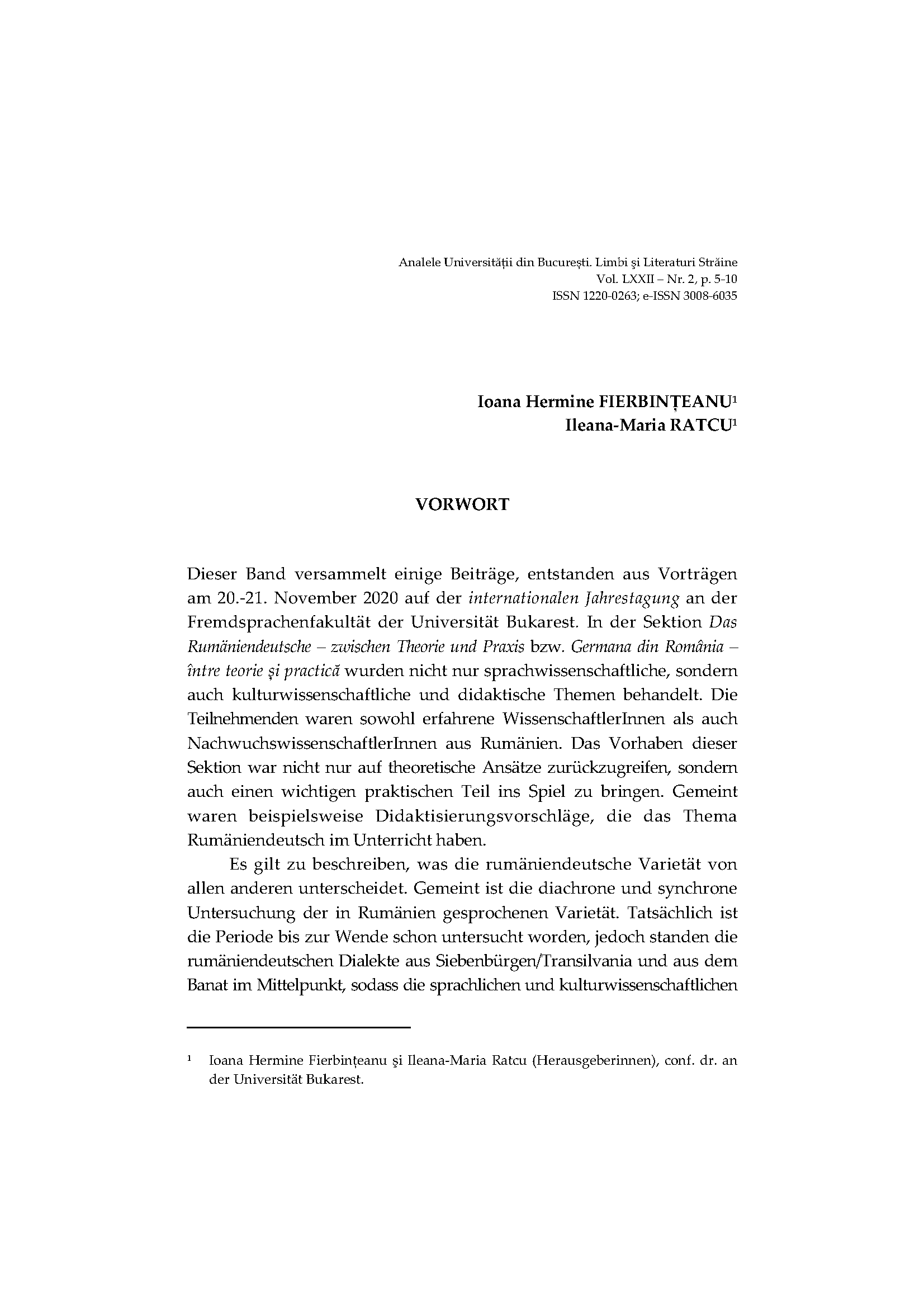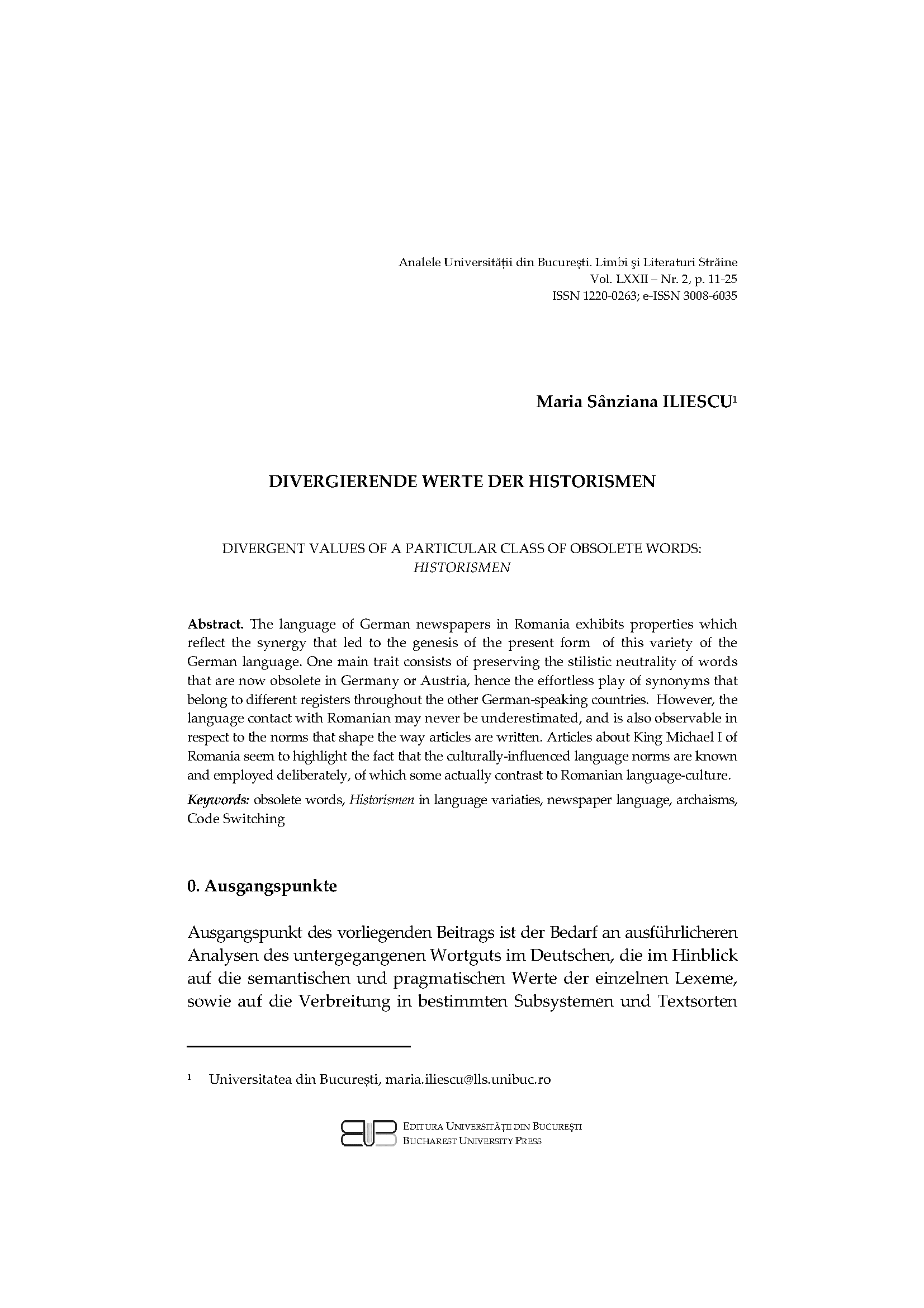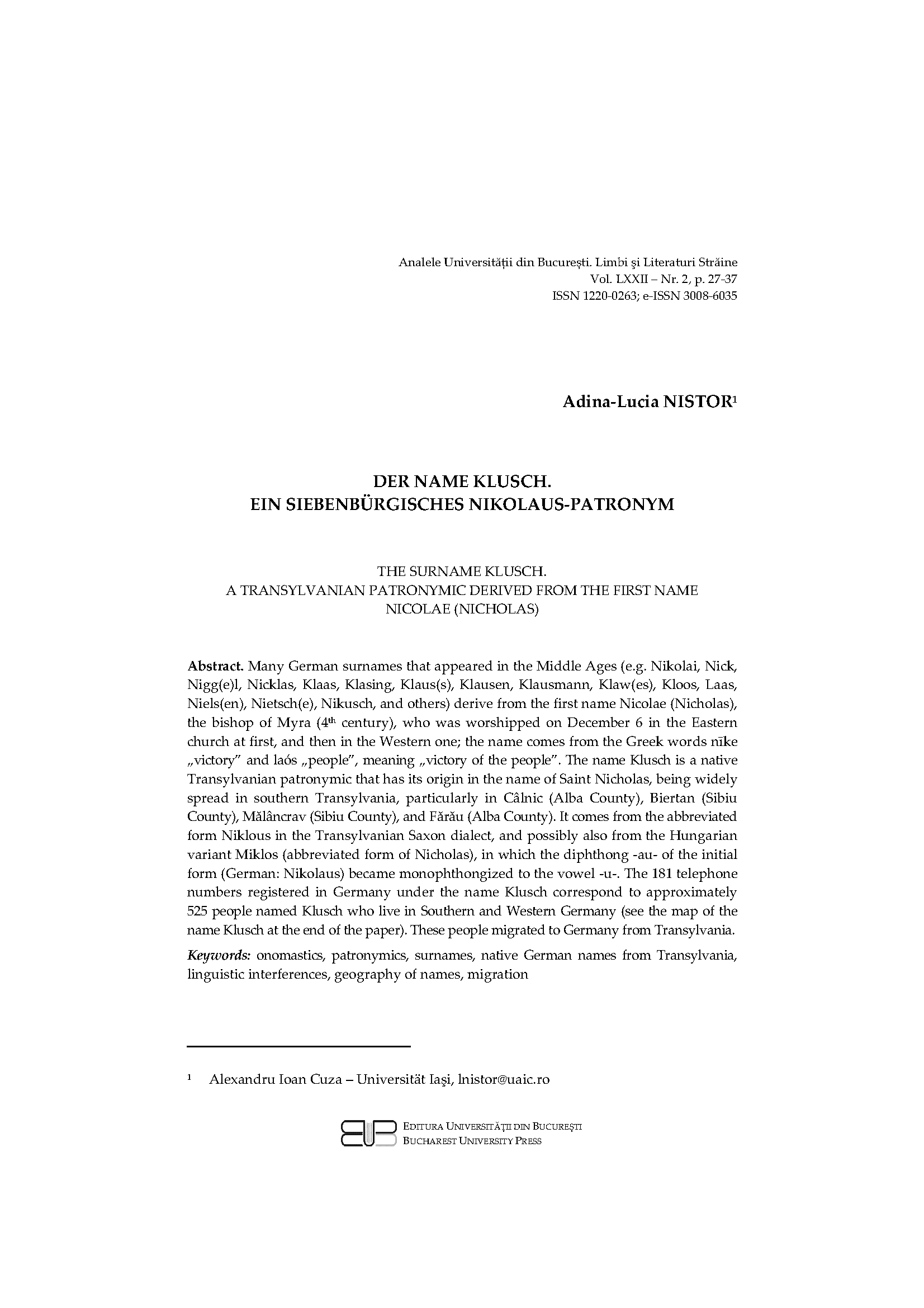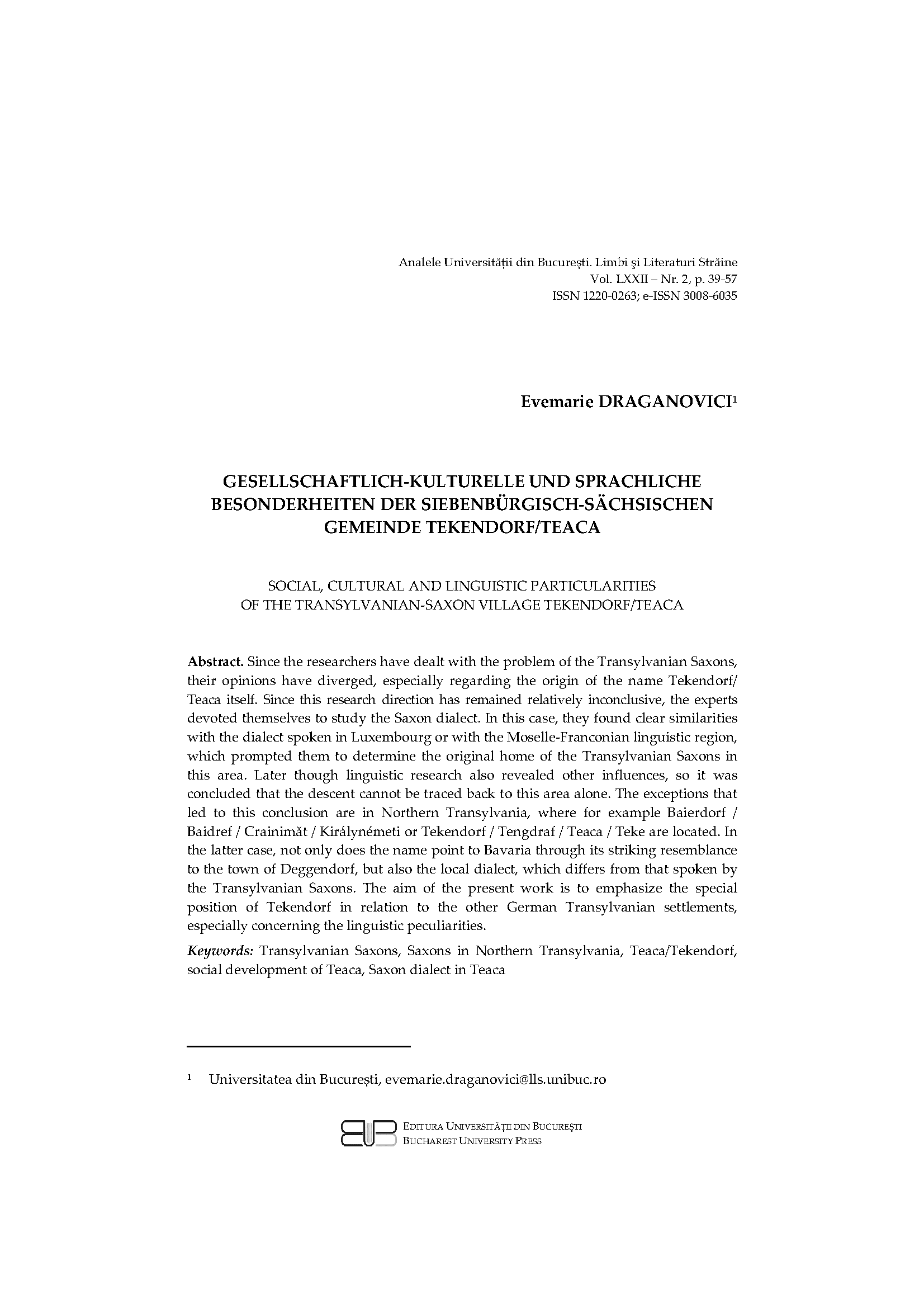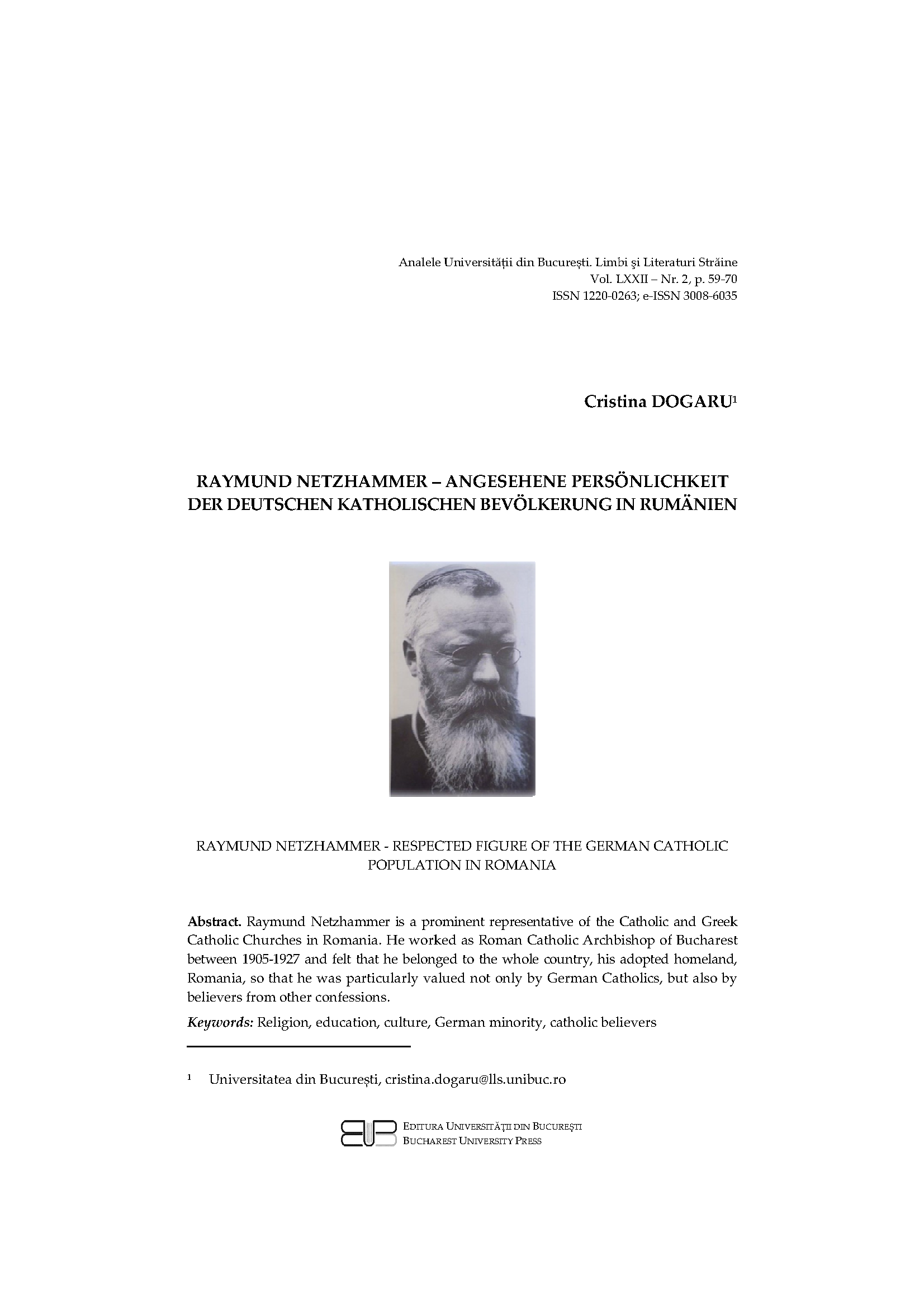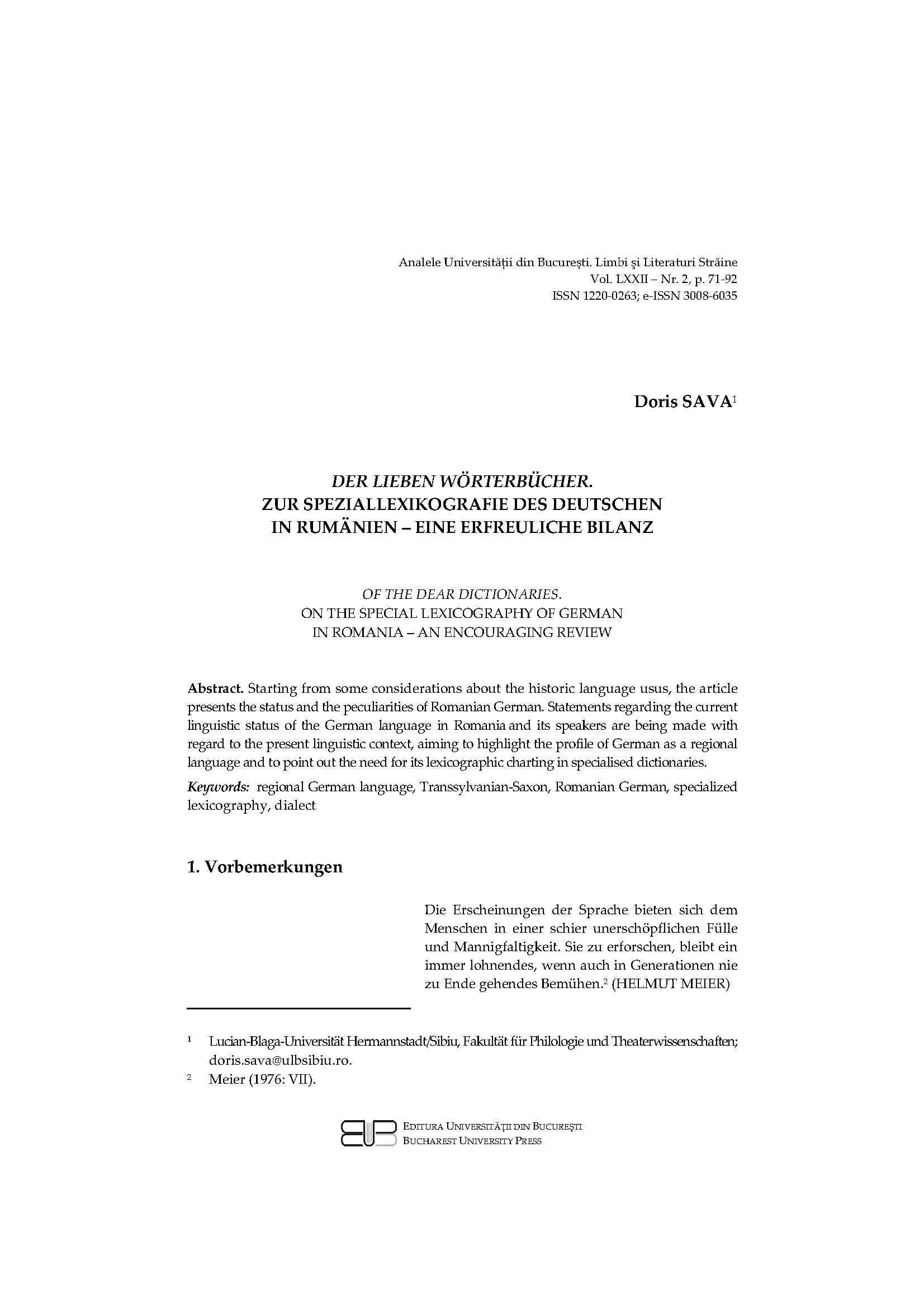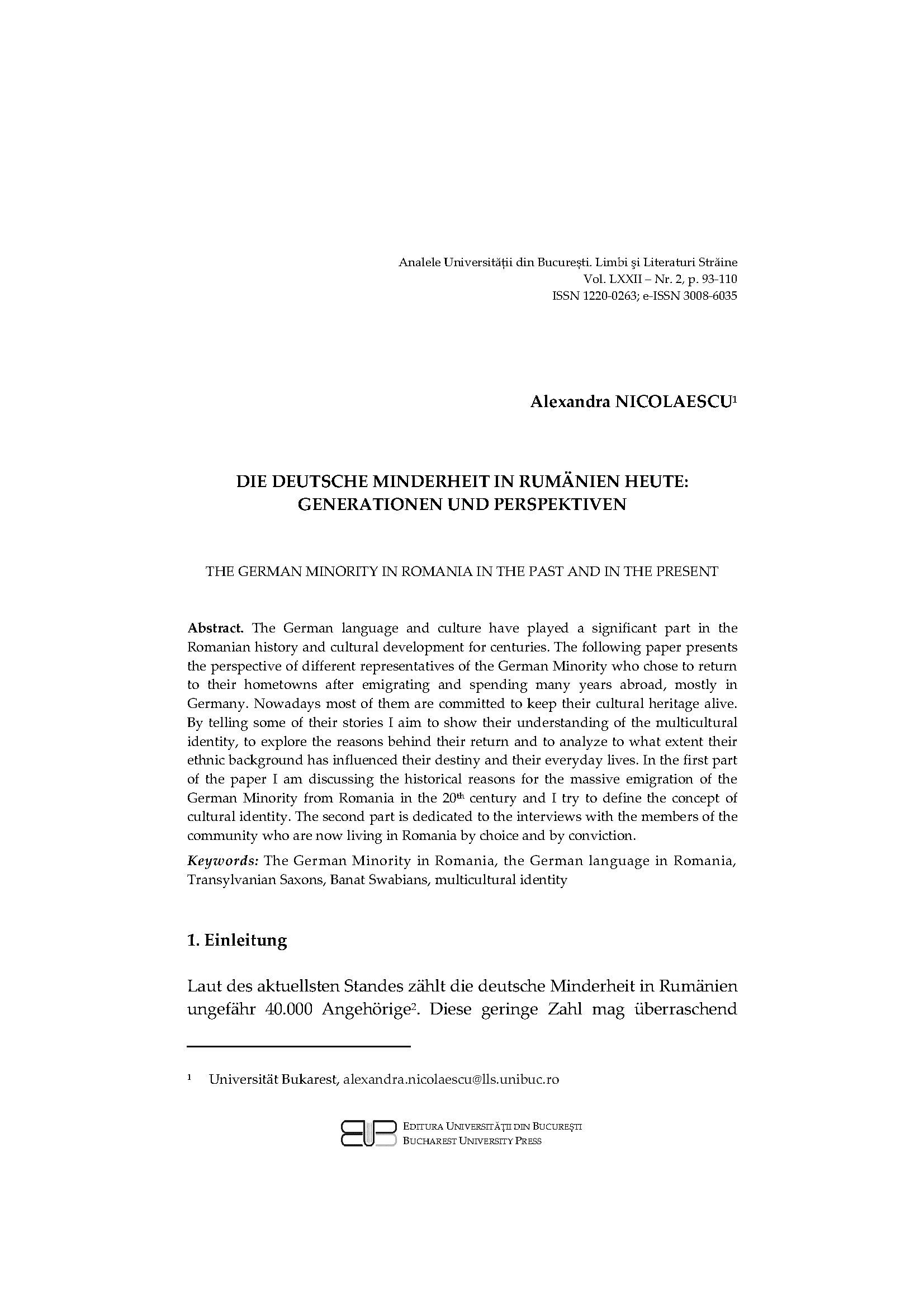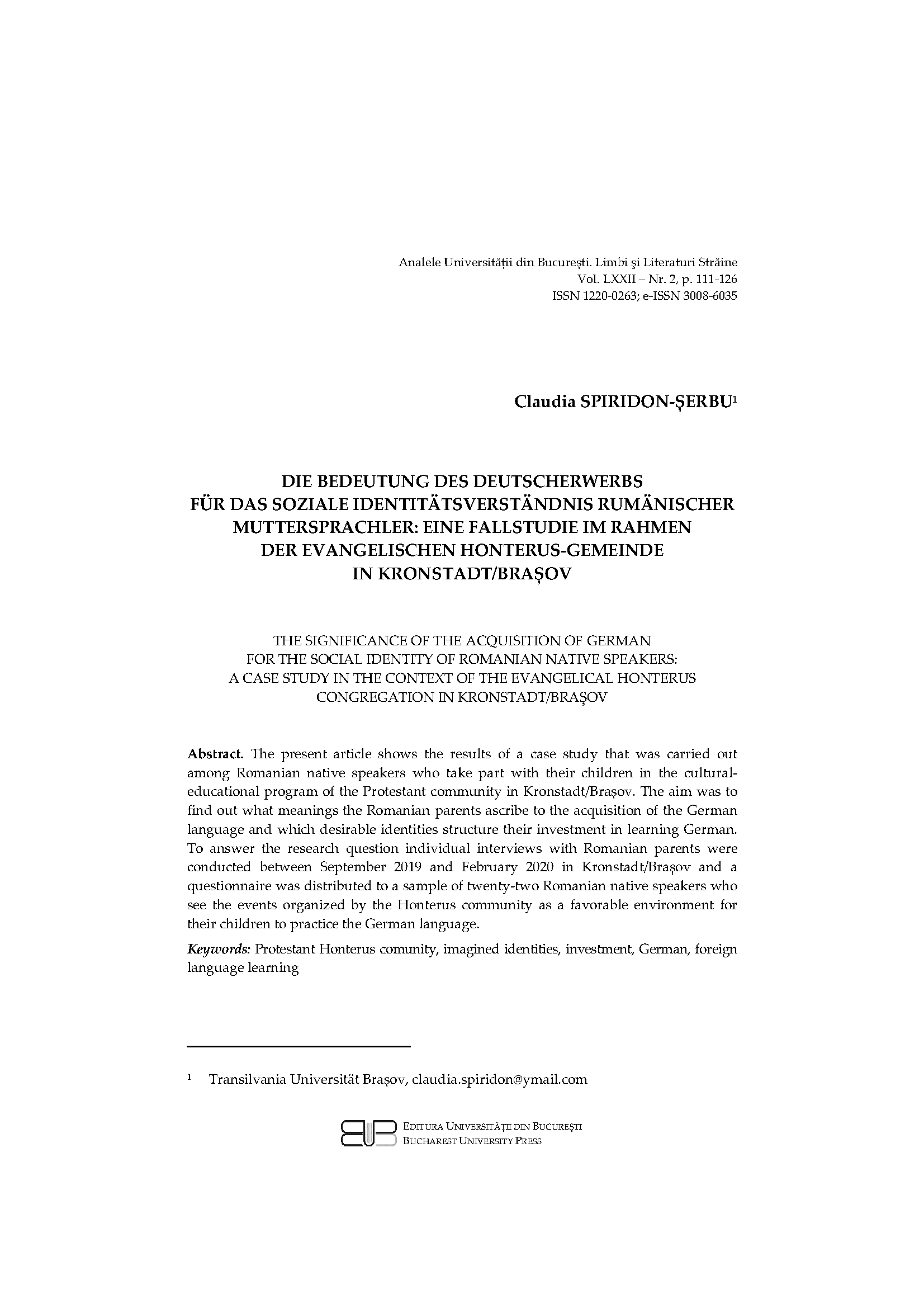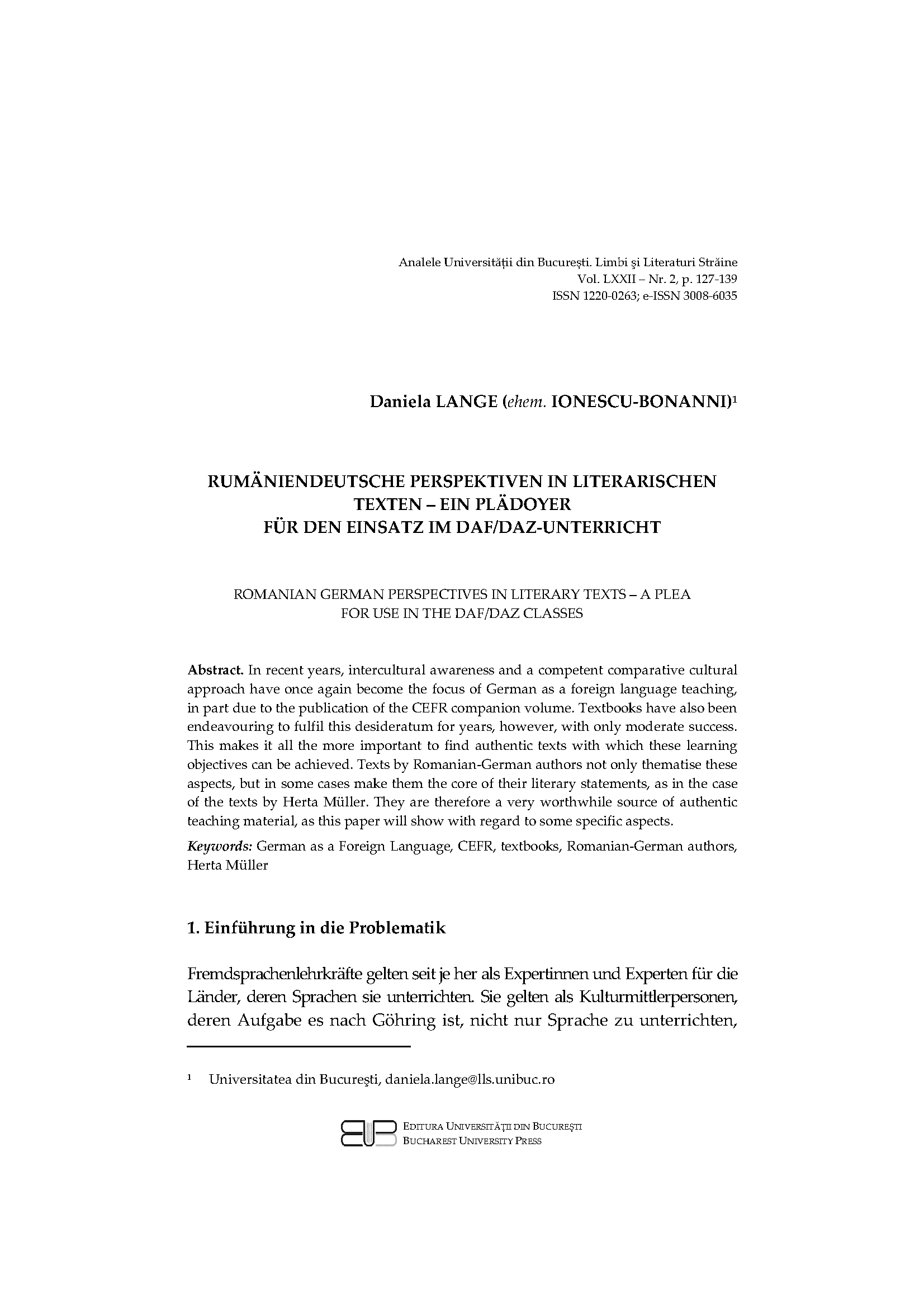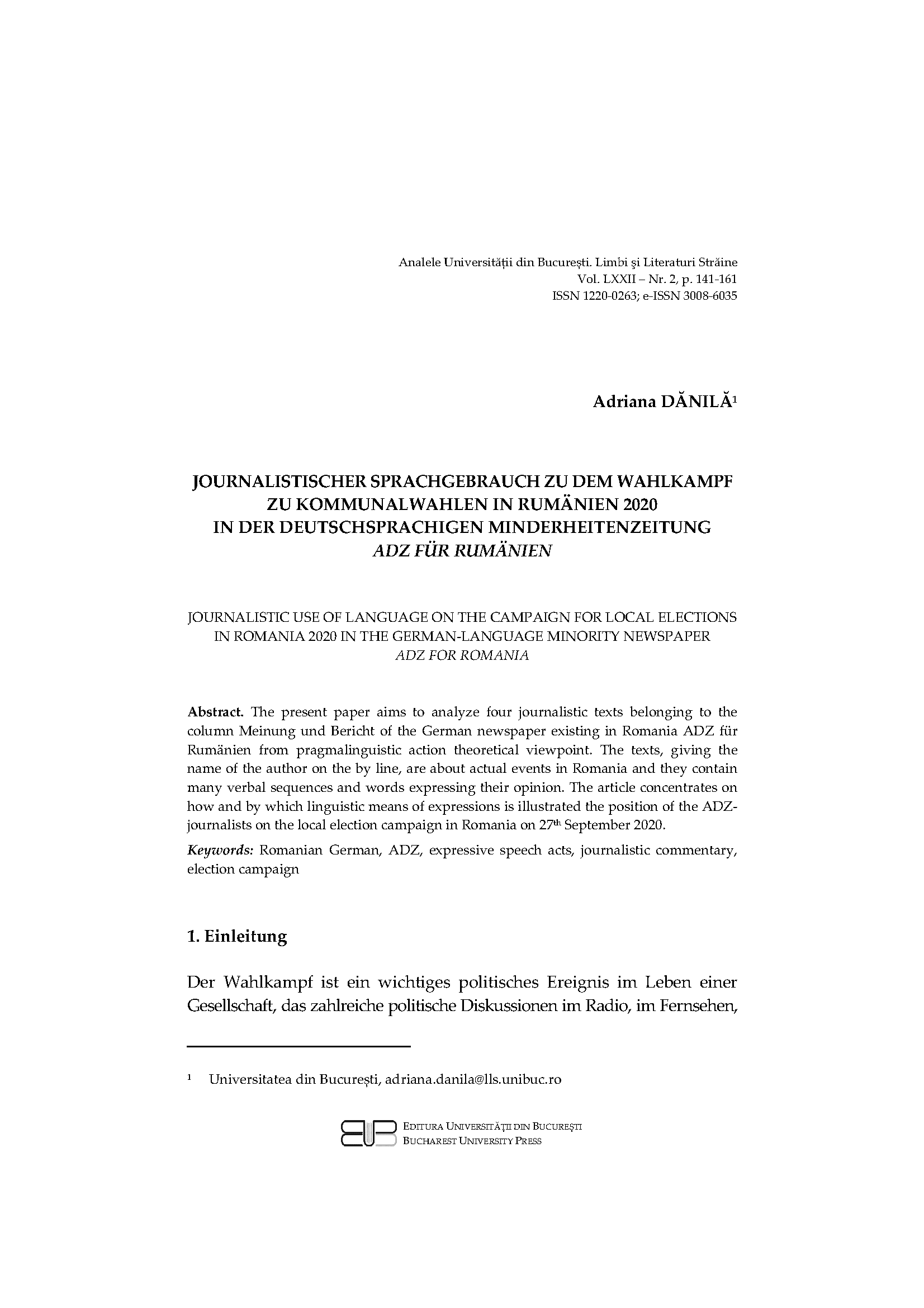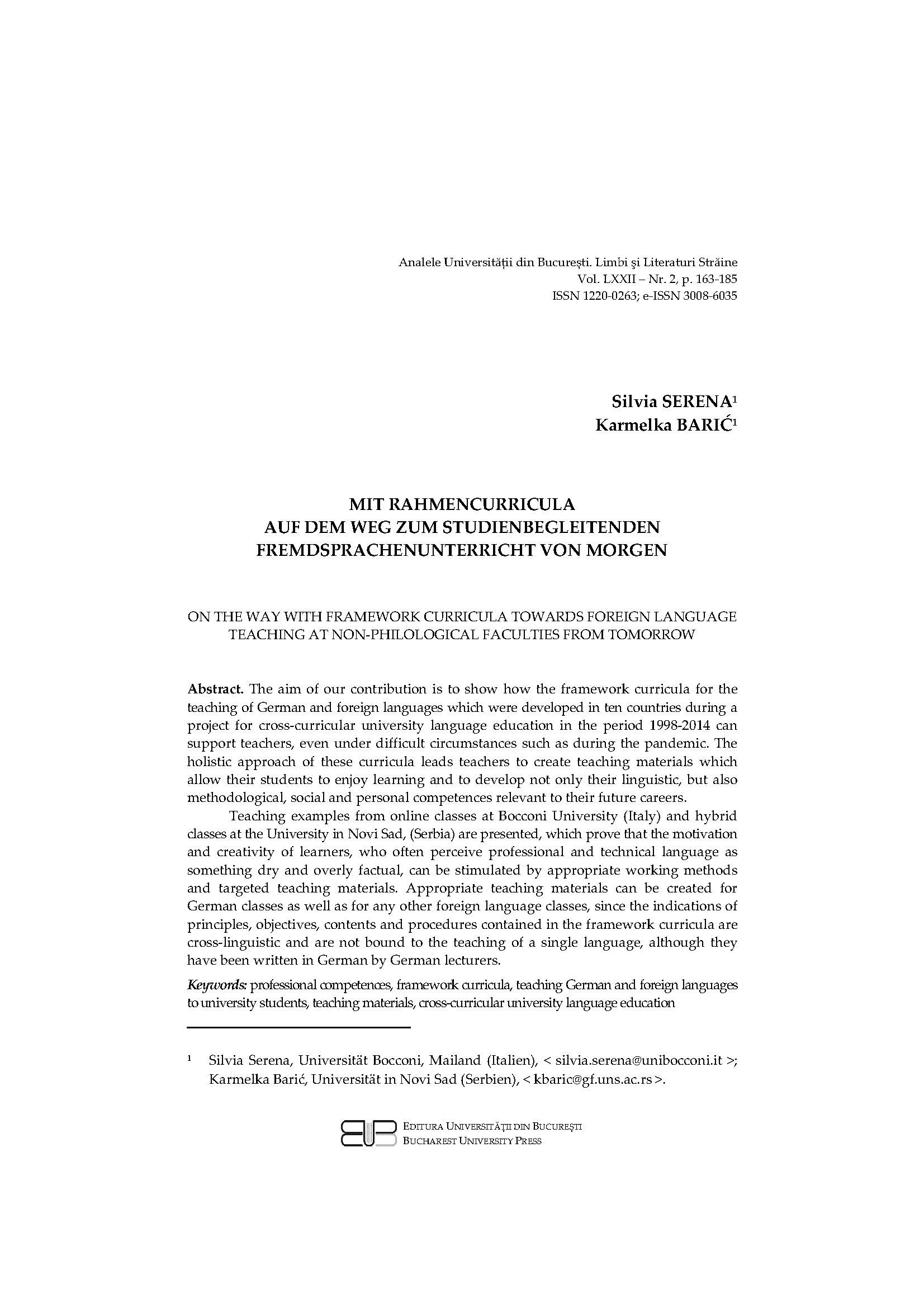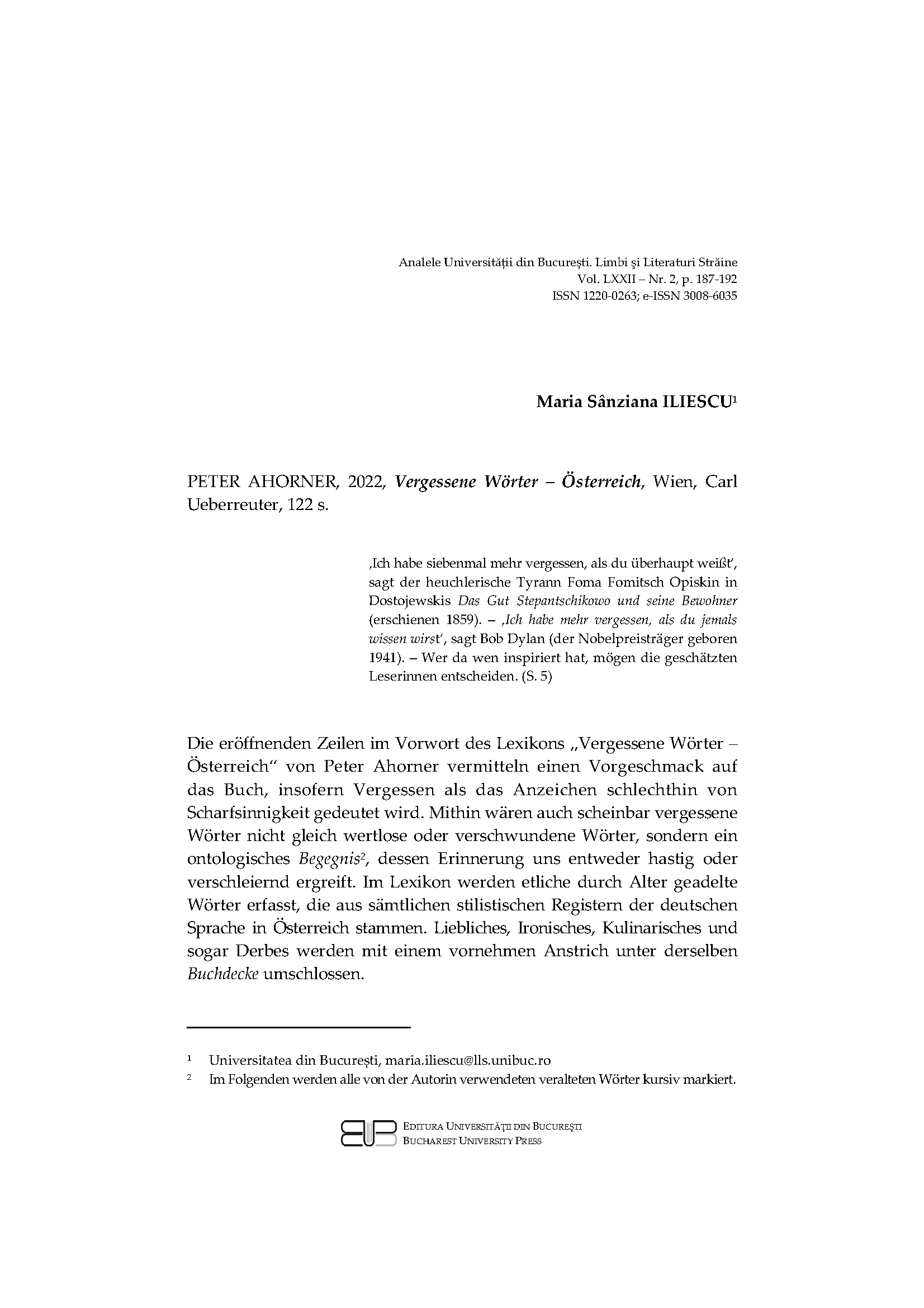Volum 72 Nr. 2 (2023): Analele Universităţii Bucureşti. Limbi şi Literaturi Străine
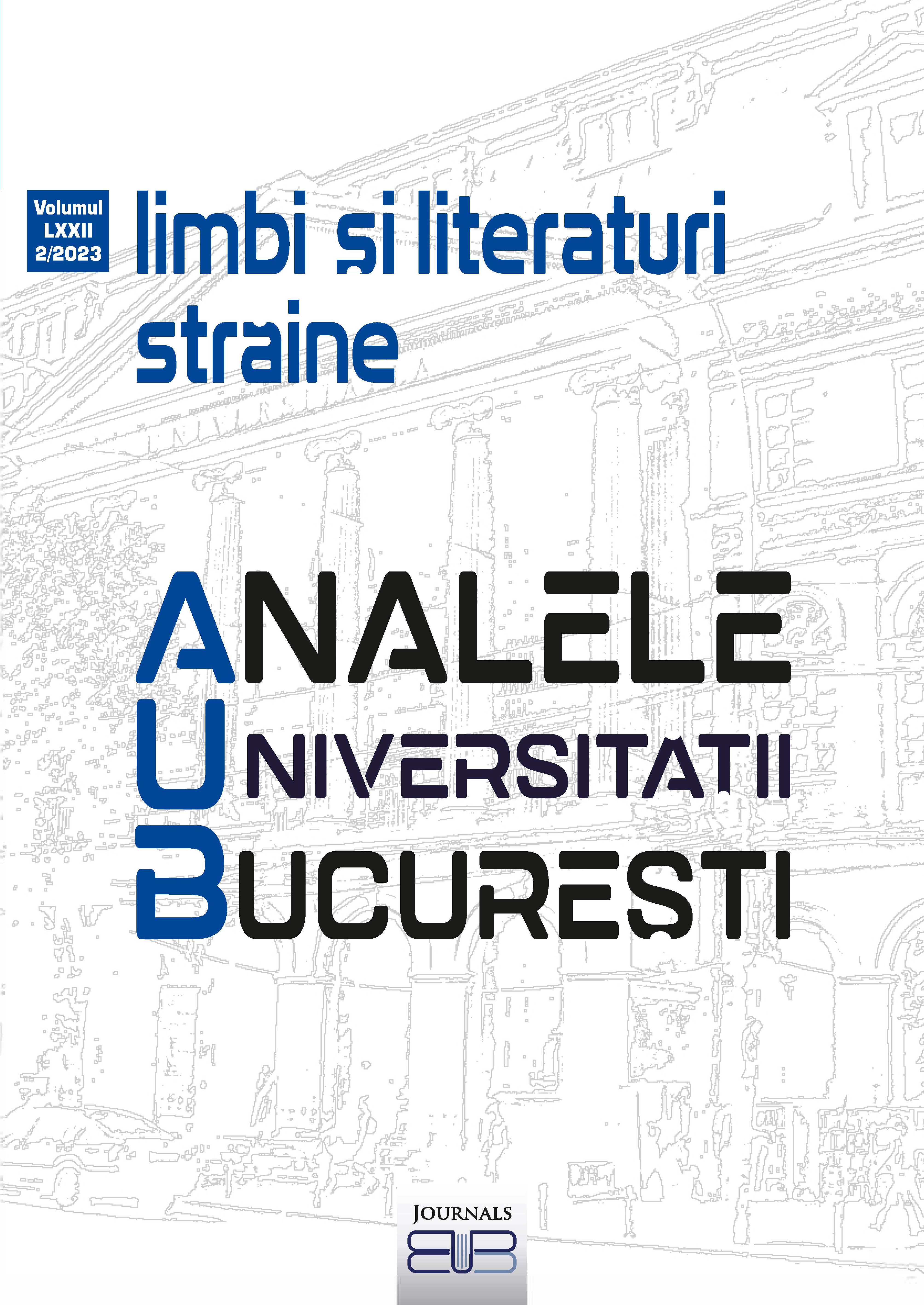
LINGVISTICĂ / LINGUISTICS / LINGUISTIK - Das Rumäniendeutsche – zwischen Theorie und Praxis - Germana din România – între teorie și practică
Număr complet
Articles
-
VORWORT
Rezumat
Dieser Band versammelt einige Beiträge, entstanden aus Vorträgen am 20.-21. November 2020 auf der internationalen Jahrestagung an der Fremdsprachenfakultät der Universität Bukarest. In der Sektion Das Rumäniendeutsche – zwischen Theorie und Praxis bzw. Germana din România – între teorie și practică wurden nicht nur sprachwissenschaftliche, sondern auch kulturwissenschaftliche und didaktische Themen behandelt. Die Teilnehmenden waren sowohl erfahrene WissenschaftlerInnen als auch NachwuchswissenschaftlerInnen aus Rumänien. Das Vorhaben dieser Sektion war nicht nur auf theoretische Ansätze zurückzugreifen, sondern auch einen wichtigen praktischen Teil ins Spiel zu bringen. Gemeint waren beispielsweise Didaktisierungsvorschläge, die das Thema Rumäniendeutsch im Unterricht haben.
-
DIVERGIERENDE WERTE DER HISTORISMEN
Rezumat
The language of German newspapers in Romania exhibits properties which reflect the synergy that led to the genesis of the present form of this variety of the German language. One main trait consists of preserving the stilistic neutrality of words that are now obsolete in Germany or Austria, hence the effortless play of synonyms that belong to different registers throughout the other German-speaking countries. However, the language contact with Romanian may never be underestimated, and is also observable in
respect to the norms that shape the way articles are written. Articles about King Michael I of Romania seem to highlight the fact that the culturally-influenced language norms are known and employed deliberately, of which some actually contrast to Romanian language-culture. -
DER NAME KLUSCH. EIN SIEBENBÜRGISCHES NIKOLAUS-PATRONYM
Rezumat
Many German surnames that appeared in the Middle Ages (e.g. Nikolai, Nick, Nigg(e)l, Nicklas, Klaas, Klasing, Klaus(s), Klausen, Klausmann, Klaw(es), Kloos, Laas, Niels(en), Nietsch(e), Nikusch, and others) derive from the first name Nicolae (Nicholas), the bishop of Myra (4th century), who was worshipped on December 6 in the Eastern church at first, and then in the Western one; the name comes from the Greek words nīke „victory” and laós „people”, meaning „victory of the people”. The name Klusch is a native
Transylvanian patronymic that has its origin in the name of Saint Nicholas, being widely spread in southern Transylvania, particularly in Câlnic (Alba County), Biertan (Sibiu County), Mălâncrav (Sibiu County), and Fărău (Alba County). It comes from the abbreviated form Niklous in the Transylvanian Saxon dialect, and possibly also from the Hungarian variant Miklos (abbreviated form of Nicholas), in which the diphthong -au- of the initial form (German: Nikolaus) became monophthongized to the vowel -u-. The 181 telephone
numbers registered in Germany under the name Klusch correspond to approximately 525 people named Klusch who live in Southern and Western Germany (see the map of the name Klusch at the end of the paper). These people migrated to Germany from Transylvania. -
GESELLSCHAFTLICH-KULTURELLE UND SPRACHLICHE BESONDERHEITEN DER SIEBENBÜRGISCH-SÄCHSISCHEN GEMEINDE TEKENDORF/TEACA
Rezumat
Since the researchers have dealt with the problem of the Transylvanian Saxons, their opinions have diverged, especially regarding the origin of the name Tekendorf/Teaca itself. Since this research direction has remained relatively inconclusive, the experts devoted themselves to study the Saxon dialect. In this case, they found clear similarities with the dialect spoken in Luxembourg or with the Moselle-Franconian linguistic region, which prompted them to determine the original home of the Transylvanian Saxons in this area. Later though linguistic research also revealed other influences, so it was concluded that the descent cannot be traced back to this area alone. The exceptions that led to this conclusion are in Northern Transylvania, where for example Baierdorf / Baidref / Crainimăt / Királynémeti or Tekendorf / Tengdraf / Teaca / Teke are located. In the latter case, not only does the name point to Bavaria through its striking resemblance to the town of Deggendorf, but also the local dialect, which differs from that spoken by the Transylvanian Saxons. The aim of the present work is to emphasize the special position of Tekendorf in relation to the other German Transylvanian settlements, especially concerning the linguistic peculiarities.
-
RAYMUND NETZHAMMER – ANGESEHENE PERSÖNLICHKEIT DER DEUTSCHEN KATHOLISCHEN BEVÖLKERUNG IN RUMÄNIEN
Rezumat
Raymund Netzhammer is a prominent representative of the Catholic and Greek Catholic Churches in Romania. He worked as Roman Catholic Archbishop of Bucharest between 1905-1927 and felt that he belonged to the whole country, his adopted homeland,
Romania, so that he was particularly valued not only by German Catholics, but also by believers from other confessions. -
DER LIEBEN WÖRTERBÜCHER. ZUR SPEZIALLEXIKOGRAFIE DES DEUTSCHEN IN RUMÄNIEN – EINE ERFREULICHE BILANZ
Rezumat
Starting from some considerations about the historic language usus, the article presents the status and the peculiarities of Romanian German. Statements regarding the current linguistic status of the German language in Romania and its speakers are being made with regard to the present linguistic context, aiming to highlight the profile of German as a regional language and to point out the need for its lexicographic charting in specialised dictionaries.
-
DIE DEUTSCHE MINDERHEIT IN RUMÄNIEN HEUTE: GENERATIONEN UND PERSPEKTIVEN
Rezumat
The German language and culture have played a significant part in the Romanian history and cultural development for centuries. The following paper presents the perspective of different representatives of the German Minority who chose to return to their hometowns after emigrating and spending many years abroad, mostly in Germany. Nowadays most of them are committed to keep their cultural heritage alive. By telling some of their stories I aim to show their understanding of the multicultural identity, to explore the reasons behind their return and to analyze to what extent their ethnic background has influenced their destiny and their everyday lives. In the first part of the paper I am discussing the historical reasons for the massive emigration of the German Minority from Romania in the 20th century and I try to define the concept of cultural identity. The second part is dedicated to the interviews with the members of the community who are now living in Romania by choice and by conviction.
-
DIE BEDEUTUNG DES DEUTSCHERWERBS FÜR DAS SOZIALE IDENTITÄTSVERSTÄNDNIS RUMÄNISCHER MUTTERSPRACHLER: EINE FALLSTUDIE IM RAHMEN DER EVANGELISCHEN HONTERUS-GEMEINDE IN KRONSTADT/BRAȘOV
Rezumat
The present article shows the results of a case study that was carried out among Romanian native speakers who take part with their children in the culturaleducational program of the Protestant community in Kronstadt/Brașov. The aim was to find out what meanings the Romanian parents ascribe to the acquisition of the German language and which desirable identities structure their investment in learning German. To answer the research question individual interviews with Romanian parents were conducted between September 2019 and February 2020 in Kronstadt/Brașov and a questionnaire was distributed to a sample of twenty-two Romanian native speakers who see the events organized by the Honterus community as a favorable environment for their children to practice the German language.
-
RUMÄNIENDEUTSCHE PERSPEKTIVEN IN LITERARISCHEN TEXTEN – EIN PLÄDOYER FÜR DEN EINSATZ IM DAF/DAZ-UNTERRICHT
Rezumat
In recent years, intercultural awareness and a competent comparative cultural approach have once again become the focus of German as a foreign language teaching, in part due to the publication of the CEFR companion volume. Textbooks have also been
endeavouring to fulfil this desideratum for years, however, with only moderate success. This makes it all the more important to find authentic texts with which these learning objectives can be achieved. Texts by Romanian-German authors not only thematise these
aspects, but in some cases make them the core of their literary statements, as in the case of the texts by Herta Müller. They are therefore a very worthwhile source of authentic teaching material, as this paper will show with regard to some specific aspects. -
JOURNALISTISCHER SPRACHGEBRAUCH ZU DEM WAHLKAMPF ZU KOMMUNALWAHLEN IN RUMÄNIEN 2020 IN DER DEUTSCHSPRACHIGEN MINDERHEITENZEITUNG ADZ FÜR RUMÄNIEN
Rezumat
The present paper aims to analyze four journalistic texts belonging to the column Meinung und Bericht of the German newspaper existing in Romania ADZ für Rumänien from pragmalinguistic action theoretical viewpoint. The texts, giving the name of the author on the by line, are about actual events in Romania and they contain many verbal sequences and words expressing their opinion. The article concentrates on how and by which linguistic means of expressions is illustrated the position of the ADZjournalists on the local election campaign in Romania on 27th September 2020.
Miscellanea
-
MIT RAHMENCURRICULA AUF DEM WEG ZUM STUDIENBEGLEITENDEN FREMDSPRACHENUNTERRICHT VON MORGEN
Rezumat
The aim of our contribution is to show how the framework curricula for the teaching of German and foreign languages which were developed in ten countries during a project for cross-curricular university language education in the period 1998-2014 can support teachers, even under difficult circumstances such as during the pandemic. The holistic approach of these curricula leads teachers to create teaching materials which allow their students to enjoy learning and to develop not only their linguistic, but also methodological, social and personal competences relevant to their future careers. Teaching examples from online classes at Bocconi University (Italy) and hybrid classes at the University in Novi Sad, (Serbia) are presented, which prove that the motivation and creativity of learners, who often perceive professional and technical language as something dry and overly factual, can be stimulated by appropriate working methods and targeted teaching materials. Appropriate teaching materials can be created for
German classes as well as for any other foreign language classes, since the indications of principles, objectives, contents and procedures contained in the framework curricula are cross-linguistic and are not bound to the teaching of a single language, although they have been written in German by German lecturers.
Book Reviews
-
PETER AHORNER, 2022, Vergessene Wörter – Österreich, Wien, Carl Ueberreuter, 122 s.
Rezumat
Die eröffnenden Zeilen im Vorwort des Lexikons „Vergessene Wörter – Österreich“ von Peter Ahorner vermitteln einen Vorgeschmack auf das Buch, insofern Vergessen als das Anzeichen schlechthin von Scharfsinnigkeit gedeutet wird. Mithin wären auch scheinbar vergessene Wörter nicht gleich wertlose oder verschwundene Wörter, sondern ein ontologisches Begegnis2, dessen Erinnerung uns entweder hastig oder verschleiernd ergreift. Im Lexikon werden etliche durch Alter geadelte Wörter erfasst, die aus sämtlichen stilistischen Registern der deutschen Sprache in Österreich stammen. Liebliches, Ironisches, Kulinarisches und sogar Derbes werden mit einem vornehmen Anstrich unter derselben Buchdecke umschlossen.

